- Home
- Mary Wesley
Not That Sort of Girl Page 4
Not That Sort of Girl Read online
Page 4
Without looking up, her mother had replied, ‘Don’t be difficult, darling. If you’ve got a pain go and lie down with a hot-water bottle; if not, you can make yourself useful addressing these envelopes. Here’s the list.’
I lacked gumption, thought Rose in old age, I dithered. The parents and Ned were so enjoying it all it would have been wicked to spoil their pleasure, deny them their wedding.
And still during those long hot September days, while Whitehall wrapped itself in sandbags and the population of London began to dress in khaki and blue, the telephone rang, but it was never Mylo.
Hard as it is to credit now, thought Rose, I was moulded by custom and family pressure, by what was right and proper for them, by what was expected of me from the moment of my conception: not unlike an animal, a pig, a racehorse, a prize winner at Crufts.
Yet there was Mylo who did not conform, and Nicholas and Emily who even then could scarcely be accused of conformity.
Rose turned on her side in the strange bed, pressed her cheek into the pillow remembering Emily’s sharp nose, bright enquiring eyes when she pottered in to ask, ‘What are you going to do in the war?’
‘I’m getting married.’
‘I know that, I mean war work.’
‘I hadn’t thought. What shall you do?’
‘We are considering possibilities, finding out what will be the most amusing for us.’
‘Us?’
‘Nicholas and me?’
‘Won’t he join up?’
‘Nicholas does not want to do anything dangerous, neither of us do. We leave that to the Hoi Polloi.’ Emily managed to give this description of her fellow-men capital lettering. Rose remembered being jolted by Emily’s honesty.
‘There are lots of reserved occupations, we shall stay together,’ Emily had said.
‘Oh,’ Rose had said. ‘Oh,’ rather shocked by Emily’s independent spirit which about that time was beginning to show itself openly.
But Emily had switched her attention from herself and her brother to Rose. ‘Rose,’ she had said. They were sitting in the hall of Rose’s home attending to the telephone which was at that moment idle. ‘Rose,’ lowering her voice slightly, for Rose’s mother was reputed to have the hearing of a bat. ‘Rose, do you know anything about sex? We are worried for you.’ She leaned towards Rose, looking her straight in the eye. ‘Do you?’
‘Of course I do.’ Rose had flushed. ‘I am getting married, aren’t I?’
‘That’s why I asked, why we worry. I bet you know nothing. That’s why I came round especially to see you, we …’
‘We?’
‘Nicholas and I. We don’t think you know the first thing. Have you for instance ever seen a naked man?’
‘I have.’ (Oh, exquisite Mylo!)
Emily laughed. ‘Rubbish. Statues perhaps. The real thing is different. Statues have very small cocks. Honestly, Rose, we are concerned about you. What has your mother told you? I bet she’s told you nothing. I bet I’m right.’
‘She said she supposed I knew all about such things.’
‘What things?’
‘I supposed she meant—you know.’
‘And you said?’
‘I said Yes, I did.’
‘I bet you did.’ Both girls went off into a fit of high-pitched giggles. Rose’s mother called from upstairs, where she sat at her desk addressing the last of the wedding invitations. ‘What are you girls laughing at, what’s the joke?’ not expecting an answer. Emily, recovering her composure whispered, ‘She didn’t even tell you to buy a pot of vaseline?’
‘Whatever for?’
‘Oh, we were right! You know nothing, nothing at all. Nicholas and I have a bet on it.’
‘I suppose you two know it all,’ Rose had said huffily. (Never, never would she divulge about Mylo.)
‘We thought we had better tell you before you get too great a surprise, getting married might be quite a shock.’
‘No thanks, it’s no business …’
‘We don’t want a repetition of when you started the curse,’ said Emily relentlessly. ‘If your mother couldn’t bring herself to tell you about that she won’t have told you what happens in bed with Ned or any other man for that matter, though Nicholas swears you will never commit adultery, we have a bet on that too.’
‘I …’ Rose remembered the humiliating experience of getting her first period while staying the night at the Rectory. Nicholas and Emily had been surprisingly informative and kind, they had not mocked. Her mother, when she returned home with the news, had said awkwardly, ‘I had meant to tell you some time.’ Perhaps, Rose remembered thinking, perhaps some time after her marriage to Ned her mother would break to her the rudiments of sex. ‘All right,’ she said grudgingly to Emily, ‘fire away.’
Listening to Emily she was amazed by Emily’s powers of invention. Some of it may be true, she had thought, but she’s crazy if she thinks it’s fun. When Emily stopped for breath Rose asked, ‘How d’you know all this?’
‘We …’ began Emily, then stopped, laughed in what for her served for embarrassment, altered course. ‘We have made you an appointment with Helena Wright.’
‘Who’s she when she’s at home?’
‘The contraceptive doctor, she’s famous,’ Emily whispered.
‘Oh.’
‘We thought we’d give you that as a wedding present. Something practical to remember us by.’
‘How thoughtful.’ Rose was overwhelmed by their interference. Even for Emily and Nicholas this was going too far. Could they have guessed at her phantom pregnancy? ‘No, thank you,’ she exclaimed. ‘Please don’t.’ She realised that to accept such a present would connect Emily and Nicholas for ever with her every sexual experience, making of them some sort of godparents. Five decades later Rose thought she might not have been sufficiently grateful for their imaginative suggestion. She had postponed making an appointment for herself until after her honeymoon when she had become more brusquely aware of what Emily referred to as ‘the facts’, a belated act which might if she had married some man other than Ned have cost her dear, precipitating Christopher into the world before his time. But Ned, so sensible, was also cautious; just as he had prepared for war so he prepared for marriage.
I remember little of my wedding, thought Rose, lying solitary in the hotel bed. My mother chose the hymns, Ned’s Aunt Flora chose the flowers (I hated gladioli then, I have hated them unforgivingly since). I remember Ned’s bishop uncle gabbled the service; was he afraid of missing his train? I remember walking down the aisle on Ned’s arm with the Peel veil tossed back so that I was able to see, as I had not been able coming up it with my father, searching the congregation for Mylo, but he was not among them and he was not in the small crowd which had gathered to gawp outside the church. He was not there.
7
‘I THINK THAT WENT off very well.’ Ned took his hand off the wheel and felt for Rose’s hands folded in her lap; he squeezed the fist they made. ‘Happy, dear?’
‘Yes.’
That might have been the moment when she could have told Ned that she detested being called ‘dear’, simply loathed it. Being called ‘dear’ made her curl up. But it was already too late. She would learn to smother her irrational dislike of this endearment and be glad that ‘darling’ belonged to Mylo. When Mylo said darling in the voice which sounded like honey kept so long in its jar it had become gritty, her whole being responded.
So in late September 1939, driving out of London on their way to Slepe when Ned squeezed her hands and said, ‘Happy, dear?’ Rose answered brightly, ‘Yes.’
Thanks to Ned’s planning the wedding had gone off without a hitch. Ned liked planning; his attention to detail would presently stand him in good stead in the Army just as it already did in business. By the end of the war he would be a staff officer. He congratulated himself that his decision to get married put in train by a conversation with his Scottish uncle was working out so well.
Some time previously,
on a bitter January day, Ned had sat with his Uncle Archibald Loftus on the sofa at the top of the stairs in the vestibule of the Hyde Park Hotel watching the people coming in and out from Knightsbridge. They had lunched at his uncle’s club, where over potted shrimps and steak and kidney pudding Uncle Archibald had suggested that now Ned had reached the age of thirty and come into his inheritance it might be advisable for him to marry. It was Uncle Archibald’s habit to tender some piece of useful advice to his nephew on the rare occasions when they met. Ned had already agreed in principle and they had returned to the hotel where his uncle and aunt were staying on a foray south to the capital from their home in Argyllshire. Now they sat amicably digesting their lunch and mulling over Uncle Archibald’s views on the relinquishment of celibacy.
‘Find a girl,’ he had said. ‘She need not be particularly pretty—that can be a nuisance—from a decent family, of course, she needn’t have money, you have plenty, this widens your field. Healthy, of course, no skeletons in cupboards, and as young as possible.’
‘Why?’
‘It’s like buying a puppy or a horse,’ said Archibald Loftus impatiently, ‘you train ’em to your ways. If you take on a girl who has had the time to have other affairs she’ll make comparisons, derogatory, unflattering. No, no, the younger the better. It’s like buying fish, you look for the sparkle in the eye and make sure the sparkle is for you. Ask your Aunt Flora.’
‘Was that how you set about it?’
‘Practically snatched her from the schoolroom.’ Archibald Loftus stretched out his long thin legs, thoughtfully lit his cigar. ‘Like a brandy?’ he asked. Ned remembered that while accepting the brandy he had realised his uncle had something more to say. Some pearl of wisdom, he had told himself, amused. ‘Your aunt won’t be back for a little while,’ said his uncle, confirming Ned’s suspicion. They had sat in silence until the waiter had brought the brandy and gone away. ‘There’s one more thing you may find useful,’ said Uncle Archibald, warming the brandy between his hands, sniffing it with his long predatory nose. ‘You may remember that my mother originated in Austria, was half Viennese?’
‘Yes?’ Ned, puzzled by this tangent, sniffed his brandy, waited for his uncle to go on.
‘Well, her uncle—we are going back to my marriage to your Aunt Flora, dear boy—my mother’s uncle, a good chap wholly Viennese and a great chap with women—but I digress—gave me a priceless piece of advice. Would you like me to pass it on?’ He swivelled a glance at Ned.
‘I shall be grateful.’
‘Needn’t take it, of course; it’s a bit, shall we say, continental.’ Uncle Archibald had laughed.
‘Oh.’ Ned had hoped that he did not sound doubtful; there were times when his uncle could be rather too robust.
‘Shall I go on?’ Ned nodded. ‘I don’t know how you feel about foreigners; being a Scot I have a soft spot for them, feel more at home with them than you people down here in London do.’
‘Make yourself clear, Uncle Archibald.’
‘I will, Ned. I am not a politician; when I make something clear it is clear, not some damn euphemism for muddle.’
‘Please go on.’ If he goes on like this I shall be late back at the office. ‘Go on, what was your mother’s Viennese uncle’s advice?’ Better listen to the old boy, Ned had thought, I respect his advice as a rule.
Uncle Archibald lowered his voice so that a group of people passing on their way to the lifts should not overhear. ‘On the morning of your wedding you fuck another woman.’ He breathed in at his cigar. ‘If you have a mistress it’s easy of course, but if not, fix yourself up with someone handy.’
‘Why?’ Ned remembered asking stupidly.
‘Dear fellow, think.’ Uncle Archibald was exasperated. ‘If you’ve already had a go you’re not in a rush, you don’t spoil your wedding night by fruitless impatience, you can afford to wait, take it slow. You are, one assumes, marrying a virgin.’
‘Oh,’ said Ned, getting the gist. ‘Ah.’
‘Naturally if you are marrying a widow it doesn’t apply. No need to take my tip, of course. I just pass it on in case it’s of use.’ Ned’s uncle had sipped his brandy, puffed at his cigar.
‘Did you act on this tip?’ Ned had enquired.
Archibald Loftus had laughed. ‘Flora and I have been happy. Ah, here she comes.’ He got up to greet his wife, Ned’s Aunt Flora, coming in from the cold street laden with parcels but wonderfully fresh surfacing from the January sales.
‘My Uncle Archibald and Aunt Flora are a good example of a happy marriage, aren’t they?’ Ned broke the silence between himself and Rose as he drove her towards Slepe and their wedding night.
‘Yes,’ said Rose.
‘Are your parents happy?’
‘I’ve never really thought about it,’ said Rose. ‘They don’t quarrel, so I suppose they are.’
‘We shall be happy,’ said Ned, driving along feeling grateful to his Uncle Archibald. ‘I want you to be happy and I want you to love Slepe.’
‘I am sure I shall. I’ve only seen it from the outside, as you know.’
‘I want it all to be a beautiful surprise,’ said Ned.
‘It will be,’ she assured him. ‘It looked lovely in the distance; I saw it from across the valley when I was riding with Nicholas and Emily.’
‘How well do you know those two?’
‘More or less all my life, it’s propinquity. Their father was our rector. My father is his solicitor. I haven’t seen so much of them since he became a bishop. They are neighbours. Why? Don’t you like them?’
‘So you wouldn’t have chosen them as friends?’
‘Maybe not. I’ve never thought about it. Why? Don’t you like them?’ Rose asked again.
‘They’re all right,’ said Ned, ‘not exactly my sort. I thought since you asked them up to Uncle Archie and Aunt Flora’s that you were close.’
‘They invited themselves,’ said Rose, ‘it was nothing to do with me.’ (Nicholas and Emily are not close to me, thought Rose, nobody is close except Mylo.)
‘Oh,’ said Ned, rearranging his thoughts. ‘Oh,’ and ‘I see.’ He drove without speaking for several miles while he stilled a faint feeling of unease. ‘I have arranged that the fires will be lit for us when we arrive and I thought it would be nice to find supper left ready for us, something simple we can heat up ourselves. We have no servants as you know, just the Farthings.’
‘The gardener and the wife who cleans?’ Rose hoped Ned would not tell her yet again about the Farthings who had cleaned and gardened for the distant cousin from whom he had inherited Slepe. She was already rather in dread of them or the idea of them, having recently read about malign old retainers in one of Daphne du Maurier’s novels.
‘Yes, them,’ said Ned. ‘We shall be alone. Nobody knows we are here, I told everyone we would spend our first night in the Ritz.’
‘So did I,’ said Rose, who had been looking forward to the Ritz, never having stepped inside its portals, but was, she hoped, too tactful to show Ned her disappointment.
‘So here we are!’ Ned had said, swinging the car off the road and up the drive. ‘There’s the house, there’s Slepe.’
‘Yes,’ said Rose, looking at its seventeenth-century charm. ‘Does it know we are coming?’
‘Nobody knows except the Farthings. I hope you will be pleased.’
‘I trust the house will be pleased,’ said Rose, running up the shallow steps, pushing open the front door, crossing the flagged hall to the log fire, looking round at what was to be her home for fifty years, ‘and of course I am.’
Ned carried in their bags, slammed shut the door. ‘Alone at last,’ he said. He took Rose in his arms: ‘Welcome to Slepe, Mrs Peel.’ He kissed her; ‘Mrs Peel.’ (He had rehearsed this sentence in his mind and was pleased now to voice it.) ‘There’s a parcel for you,’ he said in irritation, looking over Rose’s head towards the hall table.
‘Oh?’ Rose detached herself, looked at the packet: ‘It
doesn’t look important,’ she said, keeping her voice uninterested; ‘I expect it’s just something I’ve left behind.’ Ned did not seem to notice the ineptitude of this remark; he was adding logs to the fire. ‘These seem a bit damp, I would have thought—Come, dear,’ he took her arm, ‘let me introduce you to the house so that you get to know each other.’
‘I am coming,’ said Rose, feeling that the house would have to get to know Mylo as well as herself. She was unaware that beside her Ned ungratefully felt a third party present. Someone ‘handy’, had been Uncle Archibald’s expression.
‘Isn’t it marvellous to be on our own at last,’ said Ned on a rising note.
‘Yes,’ said Rose, ‘isn’t it.’ As she walked past the parcel on the hall table she idly turned it over. She noticed that the stamps on it were French. So he’s reached France, she thought, retrieving her thoughts from Dublin and sending them on a swift journey across England (he must have passed within a mile of me and I did not know), across the Channel—was the crossing rough?—and on to Paris. ‘Show me everything,’ she said, slipping her hand into Ned’s. ‘Show me the house and show me the garden before it gets dark and then let’s have supper …’
‘… and go to bed,’ said Ned.
‘Ah …’ said Rose (would it be better here than in the Ritz or worse?) ‘and …’
‘And a bottle of champagne with our supper,’ said Ned. (Somebody had said ‘prime her with booze’: Uncle Archie probably.)
‘I think I had enough at the reception,’ said Rose.
‘Oh, no, dear, you didn’t,’ said Ned.
Now, lying in the hotel bed, listening to the night sounds whispering through the open window, Rose tried to remember her wedding night.
Ned had been gentle. His ears had been cold. He had fallen asleep quite soon. Why do I only remember his cold ears? she asked herself lying wakeful as she had fifty years before. If I wrote my autobiography no reader would find the temperature of Ned’s ears particularly enthralling.

 Jumping the Queue
Jumping the Queue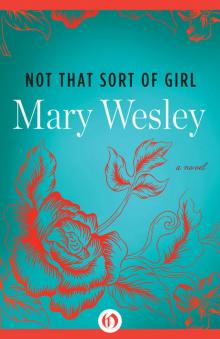 Not That Sort of Girl
Not That Sort of Girl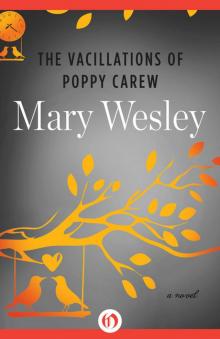 Vacillations of Poppy Carew
Vacillations of Poppy Carew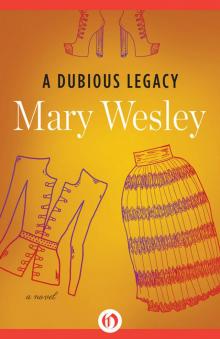 Dubious Legacy
Dubious Legacy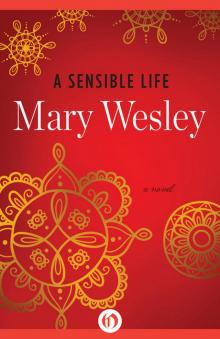 Sensible Life
Sensible Life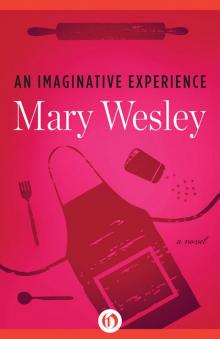 Imaginative Experience
Imaginative Experience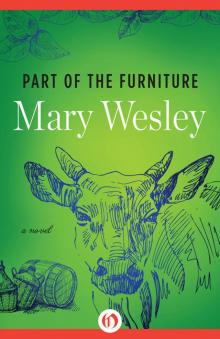 Part of the Furniture
Part of the Furniture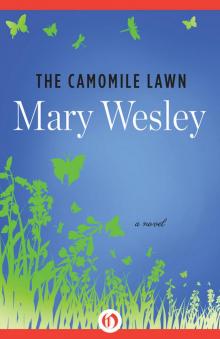 Camomile Lawn
Camomile Lawn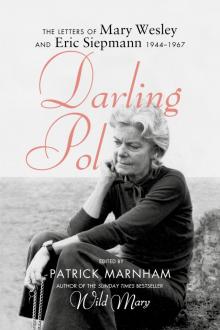 Darling Pol
Darling Pol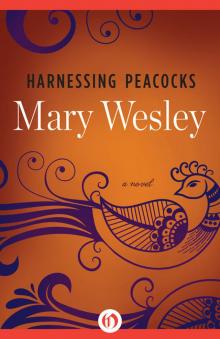 Harnessing Peacocks
Harnessing Peacocks